Cloudflare Claims Their New Free DNS Service Will Help Protect Your Privacy
On April 1, 2018, Cloudflare introduced its new DNS service which competes (mainly) with Cisco’s Open DNS and Google’s Public DNS, Cloudflare is making extraordinary claims for its DNS service including a promise of privacy backed up by 3rd-party auditing. Since it’s so new, there’s no way to verify the claims, but having an audit done by a respected company does go a long way in making this new service seem like a formidable contender.
This is not an article whose intent is to get you to change your DNS settings. Some of you who are using Google DNS or Open DNS may want to give this DNS service a try. The main purpose of this article is to make you aware of Cloudflare’s new DNS service and to explain what it does. The reason why the title says “Cloudflare Claims Their New Free DNS Service Will Help Protect Your Privacy” is not to cast doubt on this service by using the word “Claims”. We used that word because the service is only a few days old. Only time will tell. We are testing it right now – and down the road we’ll update you.
Before we dig deeper into Cloudflare’s new DNS service, it might help to understand what DNS is and what it does. But it’s quite complex so we’re going to simplify it for you:
DNS is an acronym for Domain Name System. DNS takes is an internet service that translates common domain names like google.com to IP addresses. Every web site on the internet has an IP addresses. This is like a phone number. But for most of us, remembering names is a lot easier than remembering a series of numbers. So, instead of having to remember an IP address for Google (172.217.8.14) all you have to do is remember the name Google.com.
So, when you type in www.google.com DNS servers finds the IP address 172.217.8.14 within milliseconds and you’ll see Google’s main search page open. If you can remember long series of numbers, you could actually type 172.217.8.14 in your browser and you’d end up on Google.
So what are the advantages of your changing your DNS settings. Mainly because your ISP routes all your traffic through their own DNS servers. Not all ISP’s have the fastest DNS servers. So, changing your DNS settings can make web sites open a bit faster (although honestly, you’re not likely to notice 50 milliseconds. Another reason you might want to change your DNS settings is to prevent your ISP from blocking certain sites. But the main reason why you may want to change your DNS settings if for privacy. Internet Service Providers (ISPs) route all your internet traffic through their own DNS servers. This is how they collect date about your Internet activities. They can see every site you visit and everything you do on the Internet. Yes, that’s kind of creepy, but that’s they way it works. Also, we net neutrality ends, ISPs will be able to sell data collected about you from their DNS servers.
We’ve featured tutorials before on how to change your DNS settings. For example you can read this tutorial. This tutorial shows you how to change your DNS settings to Google’s Public DNS servers, thus circumventing your ISP’s DNS servers. The tutorial also gives you a much more detailed definition of DNS for those of you with inquiring minds.
So when Cloudflare announced their new DNS service they wanted to make sure that they were offering you more than the other two major players (Google and Cisco).
The following comes directly from the Cloudflare website:
DNS: Internet’s Directory
Nearly everything on the Internet starts with a DNS request. DNS is the Internet’s directory. Click on a link, open an app, send an email and the first thing your device does is ask the directory: Where can I find this?
Unfortunately, by default, DNS is usually slow and insecure. Your ISP, and anyone else listening in on the Internet, can see every site you visit and every app you use — even if their content is encrypted. Creepily, some DNS providers sell data about your Internet activity or use it target you with ads.
We think that’s gross. If you do too, now there’s an alternative: 1.1.1.1
Privacy First: Guaranteed.
We will never sell your data or use it to target ads. Period.We will never log your IP address (the way other companies identify you). And we’re not just saying that. We’ve retained KPMG to audit our systems annually to ensure that we’re doing what we say.
Frankly, we don’t want to know what you do on the Internet—it’s none of our business—and we’ve taken the technical steps to ensure we can’t.
Faster than anything else. 28% faster, in fact.
We’ve built 1.1.1.1 to be the Internet’s fastest DNS directory. Don’t take our word for it. The independent DNS monitor DNSPerf ranks 1.1.1.1 the fastest DNS service in the world.
Since nearly everything you do on the Internet starts with a DNS request, choosing the fastest DNS directory across all your devices will accelerate almost everything you do online.
We set up Cloudflare on one of out computers yesterday and so far, so good. Cloudflare has a helfpful video tutorial on their website (along with instructions) showing you how to change the DNS settings on your computer. Visit Cloudflare and read their turtorial and watch the video.
Or, if you prefer, we’ve made our own tutorial for you. The following instructions are for Windows 10, however once you open Control Panel, you can use these instructions on Windows 7 and Windows 8.
#1. Type Control in Taskbar search (Windows 10)
#2. In Control Panel click on Network & Internet > Network Sharing Center
#3. Click on Change Adapter Settings (on the left pane)
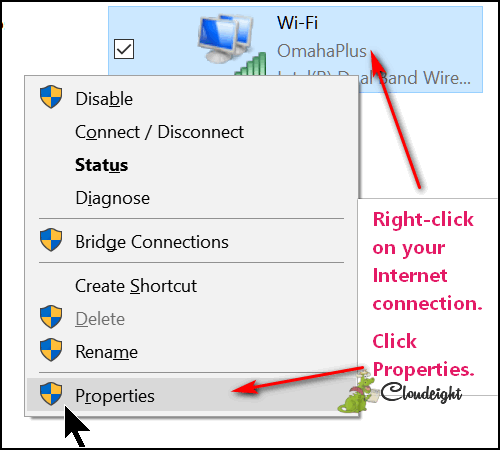
#4 Find your Internet connection then right-click on it and click on “Properties”
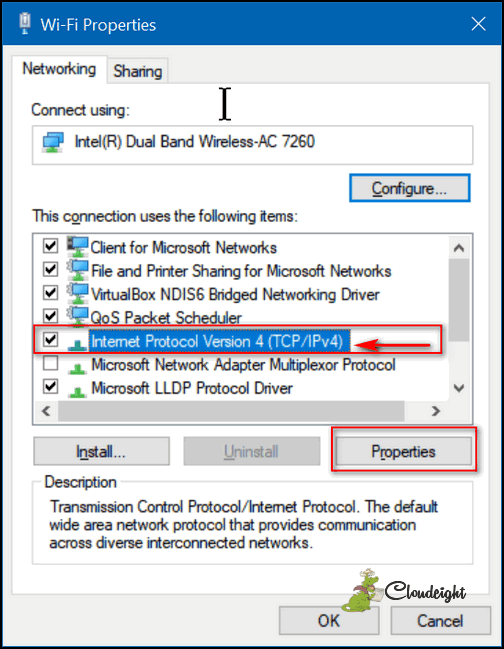
#5. In the Properties dialog(see above), click on “Internet Protocol Version 4 (TCP/IPv4)” then click on Properties. Near the bottom of the dialog window, tick the circle next to “Use the following DNS server addresses:” In the spaces type: 1 1 1 1 on the first line and 1001 on the second line.
When you’re done it should look the screenshot below. Once you’ve done this, click OK.
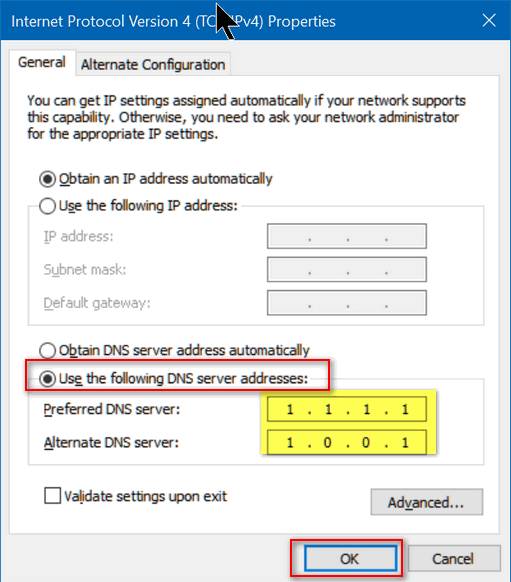
#6. Go back to the Network Properties dialog you opened before. This time, instead of highlighting “Internet Protocol Version 4…” , highlight “Internet Protocol Version 6 TCP/IPv6” and click on Properties (see our screenshot below):
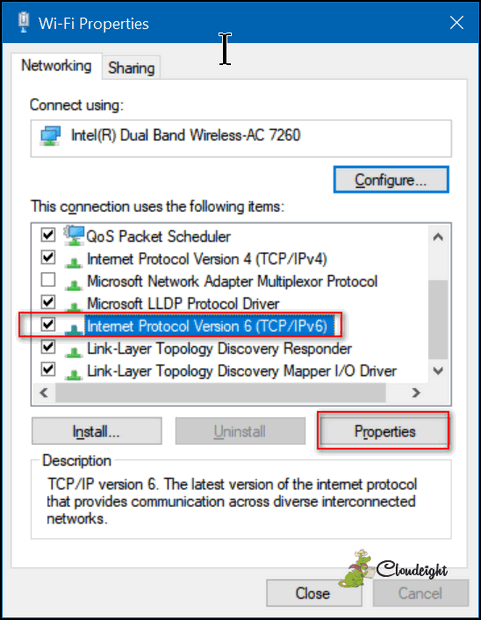
#7. In the TCP/IPv6 properties dialog tick the circle next to “Use the following DNS Server Address. And on the first line (which will be blank) type the following DNS server address:
2606:4700:4700::1111
and on the second line type this address:
2606:4700:4700::1001
Now click OK. (Note: If you choose to copy and paste those, be sure you eliminate any spaces before the number. Windows adds a space if you copy from right to left.)
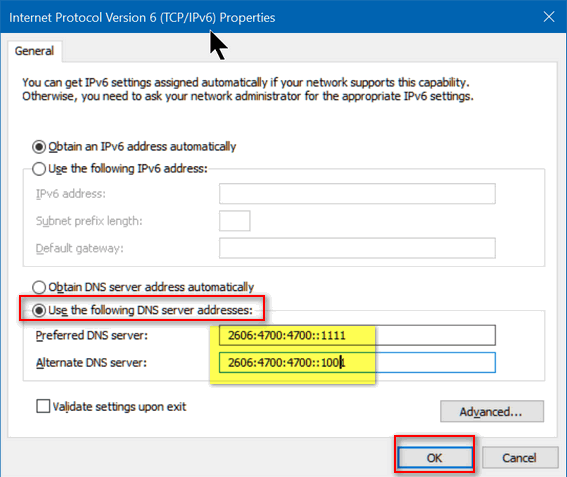
#8. Whew! Almost done. Most instructions for changing your DNS settins will tell you to close your browser and restart it. While you can do that if you like, suggest that you open a Command Prompt (Type CMD in taskbar search) and type the following command at the prompt and press Enter:
IPCONFIG /FLUSHDNS
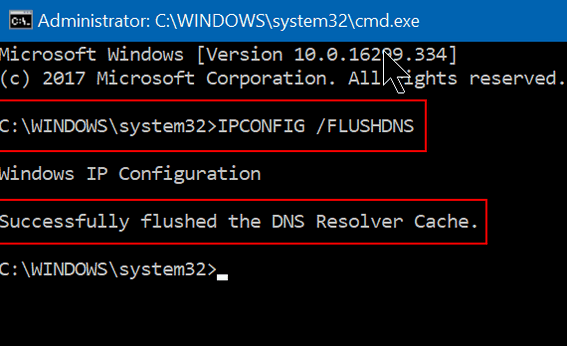
And that’s it. Keep in mind you can change your settings back to default at any time, by going back to each setting and ticking the circle next to “Obtain DNS server address automatically” in the properties dialogs for both TCP/IPv4 and TCP/IPv6.



TC, does this mean that no one would be able to find out my physical location?
This does not change your IP address. Your IP address gives your physical location – but not down to a street and house number, it will, in most cases show the town your in. But not your name… so unless someone subpoenas your ISP or serves a warrant, no one can find your address or name from your IP address. The DNS server you use can keep the pages you visit from being saved and tracked by your ISP. If you want to completely hide your location such as your state and city, you would need to use a VPN (Virtual Private Network). There are free ones, but they are suspect since they have to make money some way to stay in business. That leads to the possibility (suspicion) they log your clicks and sites you visit and may sell information. Of course, you won’t find any VPN service that will admit to that.
Thank you!